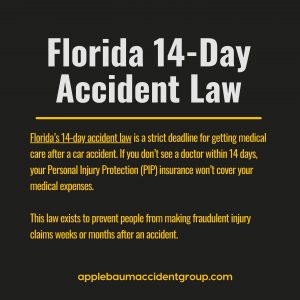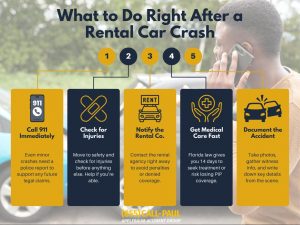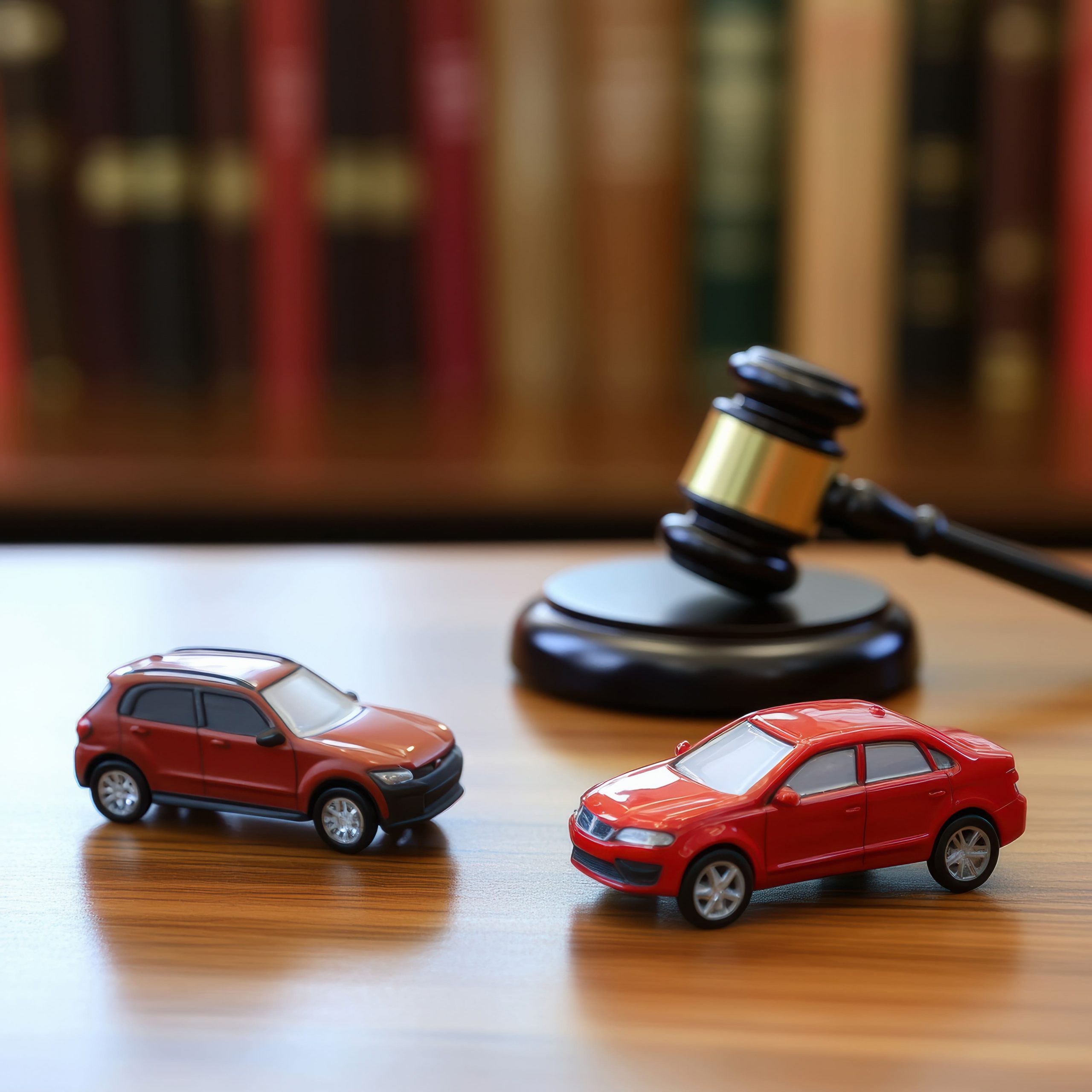If you’re in a Florida rental car accident, PIP may cover medical bills, but who pays for damage depends on fault, your insurance, and the rental contract. Tourists face unique hurdles, especially if the at-fault driver is uninsured or the 14-day medical window is missed.
Whether you’re a Florida resident or visiting from out of state, or even abroad, getting into a rental car accident can quickly become confusing and expensive. In this guide, you’ll learn who pays, how insurance works, and what to do immediately after a crash. We’ll walk you through Florida’s no-fault rules, how PIP and liability insurance apply to rentals, what happens if the at-fault driver is uninsured, and why missing the 14-day rule could ruin your case.
Who Pays After a Rental Car Accident in Florida?
If You’re at Fault
If you’re behind the wheel of a rental car in Florida and cause a crash, your personal auto insurance is likely the first line of defense. Most standard policies extend coverage to rentals, especially if you’re using the car for personal use. However, if you’re uninsured or underinsured, the financial exposure increases quickly.
Rental car companies typically offer optional protection like the Collision Damage Waiver (CDW). This isn’t insurance, it’s a contractual waiver that shifts vehicle damage costs away from you. But CDWs come with fine print. Violating the rental agreement (e.g., driving under the influence or failing to report an accident) can void coverage instantly.
Then there are loss of use and diminished value fees. Even if the rental is repaired, the company may bill you for the days it was out of service, or argue that the car’s market value dropped. These charges often surprise drivers who assumed they were fully protected.
If Another Driver Caused the Crash
Florida’s no-fault system means that your Personal Injury Protection (PIP) pays for your injuries, regardless of who caused the accident. PIP covers up to $10,000 in medical expenses and lost wages, but it won’t compensate for pain and suffering.
If the other driver was at fault, you may have a bodily injury liability (BIL) claim against them, provided they carry BIL coverage. Unfortunately, Florida doesn’t require drivers to have BIL, which leads to a frustrating reality. Many negligent drivers are either uninsured or underinsured.
In those cases, you may be able to sue for pain and suffering under Florida law, if your injuries meet the state’s serious injury threshold.
“What if I’m injured but the at-fault driver is a tourist with no U.S. insurance?”
Answer: This happens more than you’d expect, especially in tourism-heavy areas like Miami and Orlando. If you’re stuck with medical expenses and the at-fault driver lacks coverage, your own uninsured motorist protection, if purchased, can help bridge the gap. Otherwise, third-party legal action may be your only path to recovery.
Florida’s No-Fault System & How PIP Applies to Rentals
What Is PIP and How Does It Work with Rentals?
Florida requires Personal Injury Protection (PIP) as part of its no-fault system, covering up to $10,000 in medical costs and partial lost wages after motor vehicle accidents. Whether you’re in your own car or a rental, PIP generally applies if you’re a Florida resident or have an eligible insurance policy.
Tourists, however, are a different story. If you’re visiting from another U.S. state, your own policy might include PIP or MedPay. If not, you may be responsible for your medical bills, unless the rental agency provided Supplemental Liability Insurance (SLI) and it covers bodily injury.
International drivers are even more exposed. Many arrive without any coverage that complies with Florida law. Without the right protections, they’re forced to pay out of pocket or rely on a personal injury attorney to pursue compensation.
“Does the 14-day rule apply if I get care in another state after returning home?”

Answer: Yes, it does. Florida’s 14-day Accident Law requires initial medical treatment within 14 days of the crash, regardless of where it occurs. Out-of-state care can still qualify, as long as it’s properly documented and submitted within the PIP guidelines.
Why You Must Get Medical Care Within 14 Days
Florida’s PIP statute imposes a strict 14-day rule: if you don’t see a doctor within two weeks of your accident, you lose access to PIP benefits. Even if your injuries become clear later, failing to act fast could shut down your claim.
If you want to understand it better, check: Florida’s 14-day Accident Law | What You Need To Know
Qualifying care includes visits to emergency rooms, urgent care, primary physicians, and chiropractic providers. What counts as “initial treatment” is broader than some assume, but it must be documented.
If your condition is severe, obtaining an EMC (Emergency Medical Condition) designation unlocks the full $10,000 PIP benefit. Without it, PIP is capped at $2,500.
Do You Need to Use Your Own Insurance?
When Personal Auto Insurance Kicks In
If you’re a Florida resident, your auto insurance policy likely includes PIP and liability coverage that applies to rental vehicles. But not all policies are created equal, especially when you’re dealing with tourist accidents in unfamiliar rental cars.
Tourists from other states may be covered by their home policy, but they often assume protections that don’t exist. Many don’t realize they’re underinsured in Florida or mistakenly think their credit card insurance will cover everything (it rarely covers liability).
Industry tip: Always check your insurance coverage before your trip and ask if your policy complies with Florida law, especially if you’re driving in high-traffic areas like South Florida.
What If You’re Driving a Rental from Turo or Uber?
Peer-to-peer platforms like Turo and rideshare rentals add layers of confusion. Turo offers insurance packages, but not all of them include third-party liability, and most exclude damage to other vehicles. If you opted for the cheapest plan or used your personal policy, gaps likely exist.
The same applies to Uber or Lyft drivers using rentals. Your personal insurance probably won’t cover accidents while driving for work, and many commercial policies exclude peer-to-peer rentals.
What Rental Companies Don’t Tell You
One of the biggest misconceptions travelers face is that purchasing Collision Damage Waiver (CDW) means they’re fully covered. In reality, CDW only waives the rental company’s right to charge you for vehicle damage. It does not cover injuries, property damage to others, or your medical bills. That means you’re still on the hook if someone else is hurt.
Then there’s Liability Insurance Supplement (LIS). While it sounds comprehensive, LIS often includes the state minimum liability limits, which in Florida is just $10,000 per person and $20,000 per accident for bodily injury. Serious crashes can rack up bills well beyond that threshold, especially in dense metro areas like Miami.
These protections also have conditions: driving off-road, allowing an unauthorized driver behind the wheel, or failing to file a timely report may void coverage entirely. Many renters only discover these limitations after an accident, when it’s too late to fix.
What Happens When You Return the Car
Returning a damaged rental doesn’t end the story. In many cases, rental agencies charge “loss of use” fees, which represent the income lost while the car is out for repairs, even if you’re not at fault. Add to that diminished value charges (for the reduced resale value), and costs quickly spiral.
Another common situation involves disputes over pre-existing damage. If you didn’t document every scratch before leaving the lot, the company may claim you caused it.
Tourists vs Locals: Who Gets What Coverage?
U.S. Tourists
Visitors from other U.S. states often assume their auto insurance will automatically apply in Florida. And in many cases, it does, but not always. Some policies exclude out-of-state rentals, or don’t meet Florida’s coverage requirements. You may also find that PIP or MedPay benefits from your home policy don’t travel with you, leaving you without coverage for medical expenses.
Travel insurance is another blind spot. While helpful for canceled flights or lost luggage, most policies don’t cover vehicle-related injuries or liability from motor vehicle accidents.
Tourists in high-traffic tourist zones, like South Florida or near theme parks, are particularly at risk due to higher accident volumes and more complex multi-party claims.
International Drivers
If you’re visiting from abroad, the risks are even greater. Many foreign insurance policies are not valid under Florida law, and even when rental companies offer Supplemental Liability Insurance, it may not be adequate for serious injuries or multiple-vehicle crashes.
Tourists from outside the U.S. are often required to pay out of pocket upfront, and later file claims for reimbursement. This can lead to delays in care or difficulties getting treatment at local hospitals that demand proof of coverage.
What to Do Right After a Rental Car Crash

Step-by-Step Checklist
Accidents are chaotic, especially when you’re driving a rental car in a new city. Here’s what you should do immediately:
- Call 911 – Always contact emergency services, even if the damage seems minor. A police report helps establish the facts.
- Notify the rental company – Report the accident as soon as it’s safe. Delays can trigger penalties or void your insurance coverage.
- Seek medical treatment – Under Florida’s no-fault system, you only have 14 days to receive medical care in order to use PIP.
- Document every interaction – Photograph the scene, collect witness contact info, and write down any conversations with police, rental agents, or other drivers.
This process protects you legally and medically, and helps build a stronger case if you pursue a personal injury claim.
Don’t Rely on the Rental Company to Protect You
It’s tempting to believe the rental agency is in your corner. They’re not. Their priority is to protect their vehicle and their profit, not your legal rights. In fact, rental contracts often shift liability back to the renter if there’s any question of fault or late reporting.
Many rental companies only offer the bare minimum coverage required under Florida law. If you were hoping for help with injuries, lost wages, or diminished earning capacity, you’re unlikely to get it from the rental desk.
A free consultation with an experienced accident lawyer can help untangle your options. That’s where Applebaum Accident Group comes in. We know the rental car loopholes, the coverage exclusions, and how to connect victims with real help, whether you’re a local or a tourist caught off guard in a crash.
Legal Help: When & Why You Need It
Not every rental car crash requires legal action, but many do. If your injuries are serious, if your PIP benefits run out, or if the insurance companies start dragging their feet, you need someone in your corner who knows how to push back.
Florida’s no-fault rules create a maze of overlapping responsibilities. One insurer may blame another, while your rental agreement limits what you’re allowed to say. Meanwhile, medical expenses stack up and you’re left in limbo.
If your personal insurance refuses to pay, or the at-fault driver was uninsured, a personal injury attorney can help recover what you’re owed. This includes not just medical bills, but also pain and suffering, diminished earning capacity, and other long-term costs.
Choosing the Right Legal Help in Florida
If you’re from out of state, or out of the country, you may not know where to turn. Some law firms may even hesitate to take your case, especially if you’ve already flown home. That’s where having the right referral network changes everything.
The Applebaum Accident Group specializes in connecting injured people with personal injury attorneys and medical professionals who understand the stakes. Whether your crash happened in Miami, Orlando, or anywhere else in Florida, we know which attorneys will take your case seriously, and get results.
All About Rental Car Accidents in Florida
Will my international travel insurance cover injuries in a Florida rental car crash?
Answer: Typically not. Most travel insurance excludes vehicle-related injuries unless you’ve purchased an add-on specifically for motor vehicle accidents. Always confirm coverage before assuming you’re protected.
What if I didn’t get a police report but the other driver admitted fault?
Answer: Verbal admissions are rarely enough. Without a police report, insurers may deny liability or shift blame. If you skipped this step, contact a Florida accident lawyer right away, they may still recover evidence to support your claim.
Do Florida hospitals bill tourists differently if they know you’re from out of state?
Answer: Yes. Some hospitals request upfront payments from tourists or treat them as out-of-network, even if they have valid insurance coverage. This often causes delays in treatment and reimbursement.
Can I use my HSA card to pay for rental-related medical bills?
Answer: You can, but be cautious. Using your HSA may create challenges if the expenses are later reimbursed through a personal injury claim. Speak to your insurer or attorney before paying out of pocket.
How do I dispute a rental agency’s charge after I’ve already flown home?
Answer: Start by disputing the charge through your credit card company and requesting full documentation from the rental agency. If they won’t cooperate, an injury lawyer or consumer attorney may be able to help, especially if you were improperly billed for loss of use or damages you didn’t cause.
Protect Yourself, Protect Your Claim
Whether you’re just starting your personal injury claim or you’ve already hit a wall with the insurer, our team is here to help you find the right attorney, protect your rights, and fight for fair compensation. Because everyone deserves a chance to be heard, and helped.
Applebaum Accident Group connects you with trusted attorneys who understand what your case is worth, and how to make sure you don’t settle for less.
📞 855-225-5728 | Request Your Free Consultation Now
With Applebaum Accident Group, you gain access to Florida’s top legal and medical networks, without the stress or confusion. We help you move forward with confidence, clarity, and the support you need.





